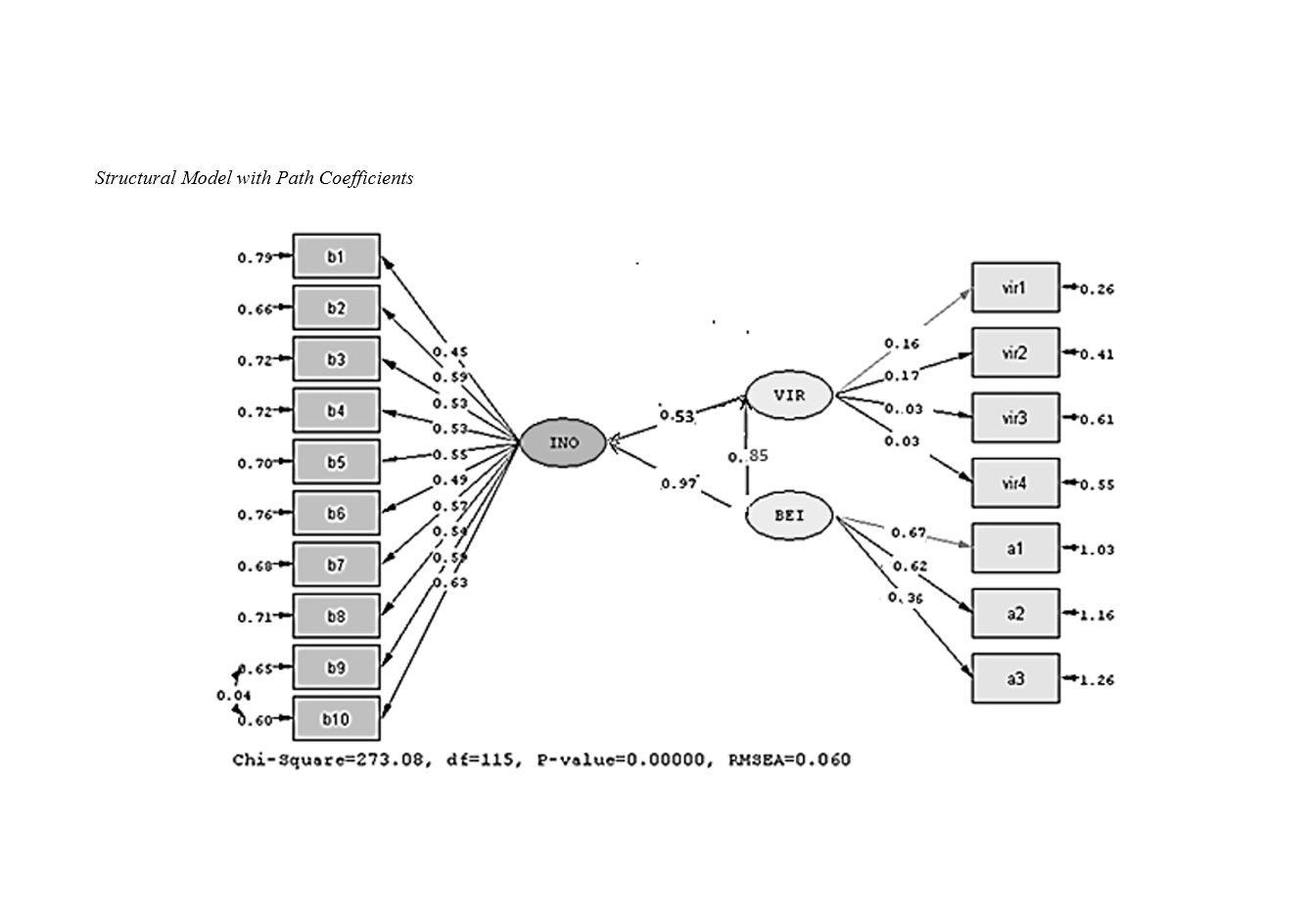Modeling Structural Relationships Between Dimensions of Personal, Social, and National Identity Among Students at Islamic Azad University, Hamedan
Keywords:
personal identity, social identity, national identity, social cohesion, structural equation modelingAbstract
This study investigates the relationships between personal identity, social identity, and national identity, with an emphasis on the mediating role of social identity in fostering national cohesion. Using a descriptive-correlational research design, data were collected from 373 university students through validated questionnaires: the Extended Objective Measure of Ego Identity Status (EOM-EIS) and the National and Social Identity Questionnaire. Structural Equation Modeling (SEM) and Confirmatory Factor Analysis (CFA) were employed to validate the measurement models and test the hypothesized relationships. The findings revealed significant direct and indirect effects among the identity dimensions. Social identity emerged as the strongest predictor of national identity (β = 0.58, p < .01), while personal identity indirectly influenced national identity through social identity (β = 0.29, p < .01). The total effect of personal identity on national identity was significant (β = 0.71, p < .001). CFA results confirmed the multidimensional nature of identity constructs, with high factor loadings in subdimensions such as ethnic, religious, and modern identities. The model demonstrated excellent fit indices (CFI = 0.93, RMSEA = 0.060), affirming its robustness. This study highlights the critical role of social identity in integrating individual values and affiliations into a collective national framework. The findings have practical implications for policymakers and educators aiming to strengthen national cohesion in multicultural societies through inclusive policies, educational reforms, and community-building initiatives. This research contributes to theoretical understanding of identity formation and its practical relevance for social cohesion, laying the groundwork for future studies exploring identity dynamics across diverse cultural contexts.
Downloads
References
Adetunji, A. (2023). Like a broom tied together: A qualitative exploration of social cohesion. PLOS Global Public Health. https://doi.org/10.1371/journal.pgph.0002508
Ansari, M. (2022). The Mediating Role of Social Intimacy in the Relationship Between Personal Identity and Social Identity with Social Adjustment Among Students of Shiraz University of Medical Sciences [Master's Thesis, Shahid Chamran University of Ahvaz, Faculty of Educational Sciences and Psychology].
Azhhari, P. (2022). The Impact of Environmental Factors on the Enhancement of Social Identity and Personal Identity in Elementary School Girls in District 2 of Ardabil City [Master's Thesis].
Bidandi, F., & Roman, N. V. (2020). Social Cohesion as an External Factor Affecting Families. Southern African Journal of Social Work and Social Development. https://doi.org/10.25159/2708-9355/7457
Cheng, Z. (2022). The Formation Mechanism of Social Identity Based on Knowledge Contribution. Sustainability.
Dielini, M. (2022). Social Cohesion and Intercultural Studies in the Educational Community. Skhid. https://doi.org/10.21847/1728-9343.2022.3(2).263601
Ghaffari Nasab, E., Mosavat, S. E., Ghaseminejad, M. A., & Alaei, A. (2016). A Sociological Study of the Socio-Cultural Factors Affecting National Identity (Case Study: Citizens Over 15 Years Old in Eqlid City). Cultural Social Development Studies Quarterly, 4(4), 3-35.
Giddens, A. (2017). Identity in the Modern World.
Holtug, N. (2021). Social Cohesion and Identity. In The Politics of Social Cohesion. https://doi.org/10.1093/oso/9780198797043.003.0003 10.1093/oso/9780198797043.001.0001
Issazadeh, F. (2021). Prediction of Social Identity Based on Personal Identity, Social Intelligence, and Social Desirability Among Afghan Female High School Students in Qom During the 2020-2021 School Year [Master's Thesis, University of Qom, Faculty of Literature and Humanities].
MacIsaac, S. (2023). What holds us together? Measuring dimensions of social cohesion in Canada. Statistical Journal of the IAOS. https://doi.org/10.3233/SJI-230055
Miller, H. N. (2020). Social Cohesion in Health. Advances in Nursing Science. https://doi.org/10.1097/ANS.0000000000000327
Moustakas, L. (2022). A Bibliometric Analysis of Research on Social Cohesion from 1994-2020. Publications. https://doi.org/10.3390/publications10010005
Moustakas, L. (2023). Social Cohesion: Definitions, Causes and Consequences. In Encyclopedia.
Ng'eno, G. (2023). National Identity and Cohesion in Kenya: A Socio-Political Discourse. EJCM. https://doi.org/10.47672/ejcm.1659
Rezaei, N. (2020). The Relationship Between Personal Identity, Social Identity, and National Identity in Iranian Students. Applied Sociology, 25(2), 159-170.
Sestito, M. (2023). Identity Conflict, Ethnocentrism, and Social Cohesion. SSRN. https://doi.org/10.2139/ssrn.4366354
Solgi, M. (2022). Modeling the Structural Relationships Between Dimensions of Personal, Social, and National Identity in Students. Psychology Journal, 26(101), 56-66.
Soltani, H., Saleh, S., & Aghapour. (2019). The Impact of Personal and Social Identity on National Identity Among Students from European Union Member Countries. Counseling Research, 18(70), 161-178. https://doi.org/10.29252/jcr.18.70.161
Tavassoli, G., & Asl Zaeim, M. (2011). Ethnic Identities and the Dilemma of National Identity. Iranian Journal of Social Development Studies, 3(2).

Downloads
Additional Files
Published
Submitted
Revised
Accepted
License
Copyright (c) 2025 Pegah Ahmadi (Author); Fariba Monazami Tabar (Corresponding Author)

This work is licensed under a Creative Commons Attribution-NonCommercial 4.0 International License.















